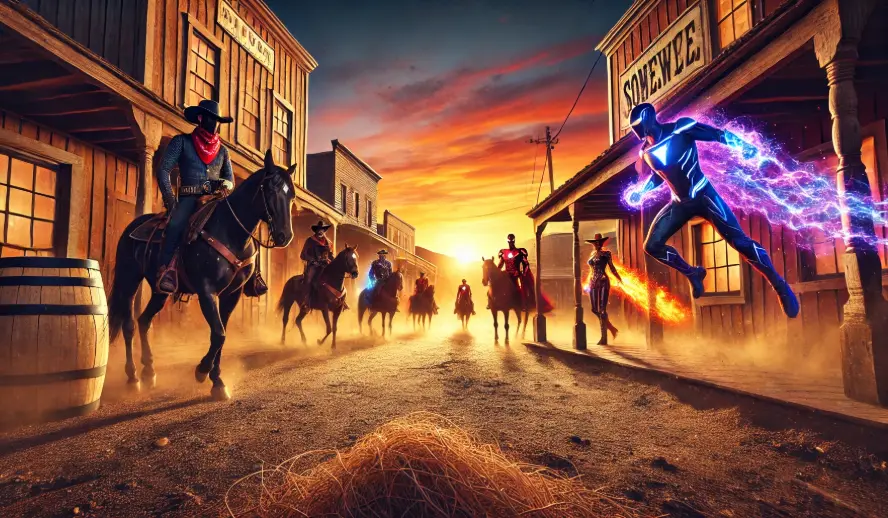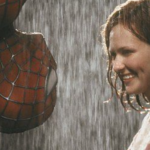Table of Contents
A Genre Too Big to Fail (So They Say)
In 2022 alone so far, we’ve gotten Matt Reeves’s ‘The Batman,’ Sam Raimi’s ‘Doctor Strange in the Multiverse of Madness,’ and of course (who can forget?) ‘Morbius.’ We’re not quite halfway into the year and we have three big-name superhero movies on our plate — and that’s actually a low number, compared to some past years. I remember, as clearly as if it were yesterday, that in 2017, we got ‘Guardians of the Galaxy Vol. 2,’ ‘Spider-Man: Homecoming,’ ‘Thor: Ragnarok,’ ‘Justice League,’ ‘Logan,’ and ‘The Lego Batman Movie.’ There was at least one superhero movie for every season, and you simply couldn’t get away from them for long. I’m not saying this is entirely a bad thing, of course; after all, I do like most of the movies mentioned. I don’t think there’s much room for debate, though, as to the omnipresence of superhero movies in the minds of the general movie-going public; if you take the time to see a movie in a theater, that movie stands a good chance of featuring heroes in capes and/or tight-fitting pseudo-armor.
The superhero “genre” is really, when you get down to it, a subgenre of action movie, and almost a cottage industry on its own, given Disney’s huge stake in the game — only substantially rivaled by Warner Bros. With no more than two major studios producing superhero movies, and the subgenre’s dominance in theaters since at least the mid-2010s, it’s tempting to make a few observations about something being too successful. Indeed, some will go so far as to say superhero movies now are like the Westerns of old — specifically when that genre was at its most prolific, during the Golden Age of Hollywood. True enough, the number of Westerns being produced in the 1940s and ‘50s was staggering, not just by big studios like Warner Bros. and Universal, but independent productions as well. Westerns in those days, also like superhero movies, starred some of the biggest actors in town; aside from the usual suspects like John Wayne and Gary Cooper, you had other A-listers like James Stewart, Spencer Tracy, Henry Fonda, and Montgomery Clift who lent their names to the Westerns. In both cases, we have (sub)genres which are simply too big to fail — until they do, as the Western declined (at least in productivity), roughly coinciding with Hollywood’s Golden Age coming to an end.
Things to do:
- Subscribe to The Hollywood Insider’s YouTube Channel, by clicking here.
- Limited Time Offer – FREE Subscription to The Hollywood Insider
- Click here to read more on The Hollywood Insider’s vision, values and mission statement here – Media has the responsibility to better our world – The Hollywood Insider fully focuses on substance and meaningful entertainment, against gossip and scandal, by combining entertainment, education, and philanthropy.
This is not to say that Westerns stopped being relevant, and it also doesn’t mean that people will suddenly stop seeing superhero movies in droves tomorrow, or next year, or even five years from now; it does, however, make a decline sound inevitable — even necessary, for the sake of the industry. Superhero movies and Westerns share quite a few similarities, in their use of recurring imagery, their tales of heroism, and their appeal to a wide market. Does this mean superhero movies are simply the heir apparent to the Western’s legacy? Not quite, and I’ll explain why.
WATCH THE TRAILER of the Film and the Revolution: ‘Can I Go Home Now?’
The Children Around the World Continue to Ask the question
Iconography, Mythmaking, and Mass Appeal
Assuming you’ve been around long enough, you have seen your fair share of movies taking place in the Marvel Cinematic Universe, or MCU — an ambitious, immensely interconnected cycle of movies, now at well over twenty and counting. You can basically track down the growing dominance of superhero movies in the 2010s and beyond simply by looking at the MCU, which has been Disney’s biggest cash cow as of late. From ‘Iron Man’ in 2008 to ‘Doctor Strange in the Multiverse of Madness,’ not even taking into account TV outings like ‘WandaVision,’ the MCU has become a genre unto itself; it has its own tropes, motifs, and unique virtues which make it easily recognizable to moviegoers. When we see the Iron Man suit, we instantly know it’s “Iron Man” because we’ve seen Iron Man many times now; we associate Robert Downey Jr. with Tony Stark, and we associate Tony Stark with Iron Man. As simple as it is (or maybe because it is so simple), we instantly recognize the Avengers’ theme. We know who Doctor Strange is because we’ve seen him in at least half a dozen movies now, despite the fact that he only has two movies with himself as a leading character.
Similarly, Westerns have recurring elements which we know seemingly by instinct. Ask someone what they think of when they think of Westerns (even if their experience with the genre is minimal) and they’ll mention small frontier towns, sheriffs, marshalls, cowboys, outlaws, the hero wearing a white or light-gray hat, the villain dressed in all black, the skirmishes with local Native American peoples, the saloons, the gunfights, etc. Never mind that a given Western may only indulge in one or two of these tropes, or in some cases none of them; the point is that in the popular consciousness, the Western is composed of shared images, character archetypes, and even actors. We associate John Wayne with the Western in much the same way we associate Robert Downey Jr. with the superhero movie. I’ve heard people say, offhandedly, that “all superhero movies are the same” in a not-dissimilar way to how some people would say the same thing about Westerns; I would say both parties are wrong, but you can see how such opinions would arise.
Related article: – Want GUARANTEED SUCCESS? Remove these ten words from your vocabulary| Transform your life INSTANTLY
Related article- A Tribute To The Academy Awards: All Best Actor/Actress Speeches From The Beginning Of Oscars 1929-2019
Finally, both genres are rooted in “low art,” which is to say art aimed at general audiences. I’m not exactly a believer in the high art versus low art debate, since a work of art in a “low” medium can be imaginative, intelligent, and morally rigorous, while conversely a work of art in a “high” medium can be stupid and dull. Superhero movies are, of course, based on comic books, which got their start in the 1930s, and which were aimed at a less-discerning readership — often children or teenagers, but not always. Westerns are also based in low art, but the sources are even older; aside from adventure stories published in pulp magazines like Blue Book in the early 20th century, the so-called wild west was being mythologized in circus shows and some of the earliest outings in Cinema history — most famously ‘The Great Train Robbery’ in 1903. Indeed, it can be easy to forget that Wyatt Earp was a real man, after all his fictional appearances in movies like ‘Tombstone’ and ‘My Darling Clementine.’
No, They’re Far from Being the Same
To say the film industry has changed drastically since Hollywood’s Golden Age would be an understatement; the criteria for a theatrical hit has narrowed considerably. While the modern blockbuster did not yet manifest in the 1950s, it was common to see hits that were original properties, or adaptations — but not sequels, remakes, or reboots. Let’s pick a random year: 1956. The top five highest grossing movies of 1956 (according to ticket sales) were ‘The Ten Commandments,’ ‘Around the World in 80 Days,’ ‘Giant,’ ‘The King and I,’ and ‘Trapeze.’ Now for 2016, the top five highest grossing movies are ‘Finding Dory,’ ‘Rogue One: A Star Wars Story,’ ‘Captain America: Civil War,’ ‘The Secret Life of Pets,’ and ‘The Jungle Book.’ The only movie listed that isn’t a sequel, prequel, remake, or reboot is ‘The Secret Life of Pets’; this may not sound so bad, until you realize that of the top ten highest grossing movies for 2016, only two are original properties — and four out of those ten are superhero movies. Westerns, meanwhile, did not have the biggest presence in theaters, even at the height of their popularity; the biggest movies of the 1950s were, more often than not, musicals and historical epics.
Related article: EVOLUTION: Every Ryan Gosling Role From 1995 to 2020, All Performances Exceptionally Poignant
Related article: EVOLUTION: Every Henry Cavill Role From 2001 to 2021, All Performances Exceptionally Poignant
Related article: All Best Actor/Actress Speeches From The Beginning Of Oscars 1929-2019 | Hollywood Insider
Related article: The 2022 NAACP Image Awards: Full List of Nominees, A History of the Ceremony, and How to Vote
A movie’s box office gross isn’t the only thing that matters, of course; there is also the question of artistic integrity, or whether something even counts as “art.” Superhero movies are art, naturally; any work that conveys ideas and emotions can be considered art, which I suspect is why the great “Are video games art?” debates of bygone years have basically died out. The problem is not whether superhero movies are artful, but rather their capacity for artistic expression. It’s telling that while ‘Joker’ is not quite a superhero movie, it is based on a superhero property, and while it stands to be the most “mature” movie of its subspecies, it’s still often criticized for being a wasteland of half-baked ideas, for all its aesthetic achievements. As much as I love ‘Logan,’ which perhaps serves as the finest hour for both Hugh Jackman and director James Mangold, it is still ultimately a simple story, both plotwise and in terms of the themes it brings to the table. ‘Black Panther,’ which takes on the hefty task of presenting an African society that never fell victim to European colonialism, is seriously bogged down by having to incorporate a stock-standard MCU plot structure. Call it a theory, but I suppose that all three of the movies mentioned are held back at least somewhat by superhero conventions, no matter how mature or subversive they try to be.
The Bubble Has to Burst Eventually
Westerns started to decline in popularity, not to mention the number of them being produced, after about 1960; however, there was a wave of creatively energetic and finely crafted Westerns being made in the latter half of the ‘60s and into the ‘70s. As the Golden Age ended and the New Hollywood movement came into being, great filmmakers like Robert Atlman and Sam Peckinpah breathed new life into a genre that seemed to be past its glory days. While the Western would never again be a prevalent force in Cinema from the ‘80s onward, there would be new quality releases in the genre, ranging everywhere from arthouse to screwball comedy. When the superhero movie declines in prevalence (and it should, for the sake of diversity at the box office, and the lifeblood of theaters in general), will it experience a similar Indian summer? I would argue no, and here’s why: with a Western, you can easily concoct an original story, or at least something that doesn’t function as part of a franchise, but superhero movies almost necessitate a franchise investment. Superhero movies are generally too expensive, and too reliant on big studios backing their productions, to take serious artistic risks. ‘Black Panther’ is part of a franchise that is more or less geared towards children, and while there is probably an alternate timeline where ‘Black Panther’ seriously examined the long and thorny history of Africa and colonization, we got a movie that is deceptively unchallenging.
Related article: Understanding the Star Wars Timeline
Related article: A Tribute to Francis Ford Coppola: One of Cinema’s Unforgettable Directors | ‘Megalopolis’, ‘The Godfather’ & More
Related article: #metoo Revolution: Powerful Questions That Need Answers
Related article: FACT-CHECKED Series: Timothee Chalamet and 32 Facts about The Young Superstar
When superhero movies go, what will replace them? Even scarier question: What if superhero movies don’t go away in the next decade or so? At the rate things are going, movie theaters will only serve two opposite and extreme functions: film festivals and franchise blockbusters. The movie theater will become more segregated, less diverse, more insular; in the old days, you would go to the theater to see “the movies,” any movies, but with the advent of streaming the theater has become more niche and outmoded. Theaters survived the advent of television, in part because the market for theatrical releases (movies that you have to see on the big screen) was no less diverse than before, and while streaming certainly presents the biggest existential threat to theaters, the borderline monopoly superhero movies and their adjacent counterparts (franchise pieces) may well quicken the theater’s demise. Something has to be done about this, and soon.
By Brian Collins
Click here to read The Hollywood Insider’s CEO Pritan Ambroase’s love letter to Cinema, TV and Media. An excerpt from the love letter: The Hollywood Insider’s CEO/editor-in-chief Pritan Ambroase affirms, “We have the space and time for all your stories, no matter who/what/where you are. Media/Cinema/TV have a responsibility to better the world and The Hollywood Insider will continue to do so. Talent, diversity and authenticity matter in Cinema/TV, media and storytelling. In fact, I reckon that we should announce “talent-diversity-authenticity-storytelling-Cinema-Oscars-Academy-Awards” as synonyms of each other. We show respect to talent and stories regardless of their skin color, race, gender, sexuality, religion, nationality, etc., thus allowing authenticity into this system just by something as simple as accepting and showing respect to the human species’ factual diversity. We become greater just by respecting and appreciating talent in all its shapes, sizes, and forms. Award winners, which includes nominees, must be chosen on the greatness of their talent ALONE.
I am sure I am speaking for a multitude of Cinema lovers all over the world when I speak of the following sentiments that this medium of art has blessed me with. Cinema taught me about our world, at times in English and at times through the beautiful one-inch bar of subtitles. I learned from the stories in the global movies that we are all alike across all borders. Remember that one of the best symbols of many great civilizations and their prosperity has been the art they have left behind. This art can be in the form of paintings, sculptures, architecture, writings, inventions, etc. For our modern society, Cinema happens to be one of them. Cinema is more than just a form of entertainment, it is an integral part of society. I love the world uniting, be it for Cinema, TV, media, art, fashion, sport, etc. Please keep this going full speed.”
More Interesting Stories From The Hollywood Insider
– Want GUARANTEED SUCCESS? Remove these ten words from your vocabulary| Transform your life INSTANTLY
– A Tribute to Martin Scorsese: A Complete Analysis of the Life and Career of the Man Who Lives and Breathes Cinema
– Do you know the hidden messages in ‘Call Me By Your Name’? Find out behind the scenes facts in the full commentary and In-depth analysis of the cinematic masterpiece
– A Tribute To The Academy Awards: All Best Actor/Actress Speeches From The Beginning Of Oscars 1929-2019 | From Rami Malek, Leonardo DiCaprio To Denzel Washington, Halle Berry & Beyond | From Olivia Colman, Meryl Streep To Bette Davis & Beyond
– In the 32nd Year Of His Career, Keanu Reeves’ Face Continues To Reign After Launching Movies Earning Over $4.3 Billion In Total – “John Wick”, “Toy Story 4”, “Matrix”, And Many More










